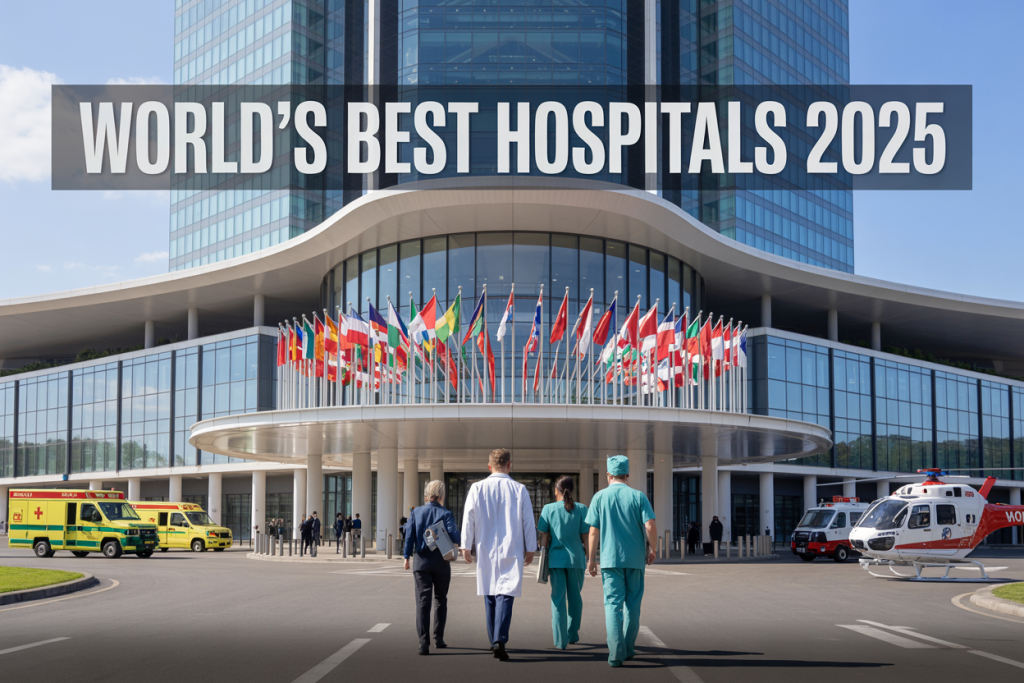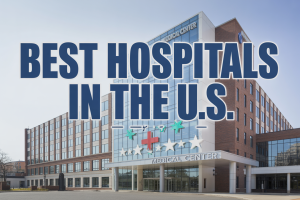Finding the top 10 best hospitals in the world 2025 can feel overwhelming when you need critical medical care or are planning medical tourism. This guide is for patients, families, and healthcare professionals who want to identify the world’s best hospitals 2025 based on cutting-edge technology, outstanding patient outcomes, and global recognition.
The best hospitals in the world share common traits: they attract top medical talent, invest heavily in research, and maintain exceptional safety standards. These most advanced hospitals in the world often serve as training grounds for future healthcare leaders and pioneering treatment centers that shape medical practices globally.
We’ll explore what sets apart the best medical centers globally by examining their innovative technologies and specialized programs. You’ll discover how top global hospitals ranking systems evaluate these institutions and learn about the best hospitals for medical tourism that welcome international patients. Finally, we’ll break down the top-rated hospitals with best healthcare facilities across different continents to help you make informed decisions about your healthcare needs.
Defining Excellence in Global Healthcare Standards
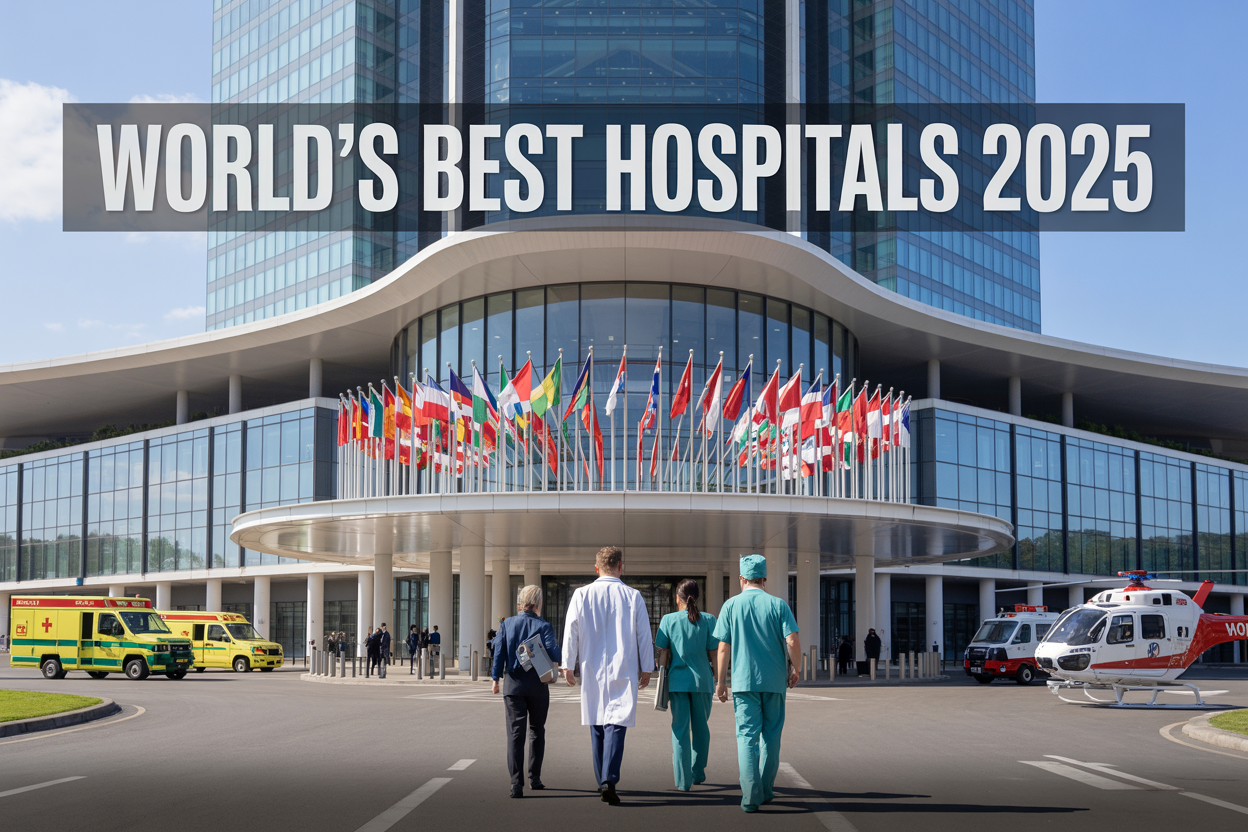
Advanced Medical Technology and Equipment
The best hospitals in the world distinguish themselves through cutting-edge medical technology that pushes the boundaries of what’s possible in healthcare. These institutions invest millions in state-of-the-art equipment like robotic surgical systems, advanced imaging technology, and AI-powered diagnostic tools that deliver precision beyond human capability.
Leading medical centers globally house equipment such as the da Vinci surgical robots, which enable minimally invasive procedures with microscopic precision. These systems allow surgeons to operate through tiny incisions while providing 3D visualization and enhanced dexterity. Top global hospitals ranking consistently features institutions that have embraced hybrid operating rooms, combining real-time imaging with surgical capabilities.
Advanced MRI machines with 3T and 7T magnetic field strengths provide unprecedented detail in brain and body imaging. The most advanced hospitals in the world also deploy PET-CT scanners that can detect cancer cells as small as 4mm, revolutionizing early detection protocols. Proton beam therapy systems, costing upward of $200 million, represent the pinnacle of cancer treatment technology, delivering targeted radiation with minimal damage to healthy tissue.
Artificial intelligence integration sets apart top 10 hospitals in the world from regional facilities. AI algorithms analyze medical images faster than radiologists, predict patient deterioration hours before symptoms appear, and assist in drug discovery processes. These systems process thousands of data points simultaneously, identifying patterns that human physicians might miss.
Internationally Accredited Medical Staff
World’s best hospitals 2025 maintain exceptionally high standards for physician credentials and continuous education. Board-certified specialists with international training form the backbone of these institutions. Many physicians hold multiple certifications from prestigious medical boards across different countries, demonstrating their global expertise.
These medical centers recruit talent worldwide, creating diverse teams that bring varied perspectives and techniques. Surgeons often train at multiple institutions across continents, mastering different approaches to complex procedures. The recruitment process typically involves extensive peer review, publication requirements, and demonstrated excellence in subspecialty areas.
Continuous medical education programs ensure staff stay current with rapidly evolving medical knowledge. Top-rated hospitals with best healthcare facilities mandate annual training requirements that exceed standard licensing requirements. Physicians participate in international conferences, research collaborations, and skills workshops throughout their careers.
Multidisciplinary team approaches characterize these institutions. Rather than working in silos, specialists collaborate across departments, bringing collective expertise to challenging cases. Tumor boards, for example, include oncologists, radiologists, pathologists, and surgeons who jointly develop treatment plans.
Patient Safety and Quality Metrics
Patient safety protocols at elite hospitals exceed international standards through rigorous monitoring and prevention systems. These institutions track infection rates, medication errors, surgical complications, and readmission rates with transparent reporting mechanisms. Best hospitals for medical tourism maintain infection rates well below global averages through strict sterilization protocols and isolation procedures.
Quality metrics include patient satisfaction scores, clinical outcomes data, and mortality rates adjusted for case complexity. The best medical centers globally publish their outcomes transparently, allowing patients and referring physicians to make informed decisions. Key performance indicators include:
- Hospital-acquired infection rates below 2%
- Medication error rates under 0.1%
- Surgical site infection rates below national averages
- Patient satisfaction scores exceeding 95%
- Nurse-to-patient ratios optimized for patient acuity
Electronic health records with built-in safety checks prevent medication interactions and dosing errors. Barcode scanning systems verify patient identity and medication accuracy at multiple checkpoints. These hospitals implement fail-safe systems that require multiple verifications before high-risk procedures.
Research and Innovation Capabilities
Research drives continuous improvement at top 10 best hospitals in the world 2025. These institutions conduct clinical trials for breakthrough treatments, often serving as primary research sites for pharmaceutical companies and medical device manufacturers. Their research departments collaborate with universities and biotechnology companies to accelerate medical discoveries.
Clinical trial participation gives patients access to experimental treatments years before they become widely available. These hospitals maintain comprehensive research databases that contribute to global medical knowledge. Publication rates in peer-reviewed journals serve as indicators of research productivity and scientific impact.
Innovation labs within these hospitals develop new medical devices, treatment protocols, and surgical techniques. Biomedical engineers work alongside physicians to create custom solutions for complex medical challenges. 3D printing laboratories produce patient-specific implants and surgical guides tailored to individual anatomy.
Genomic medicine programs analyze patient DNA to personalize treatment approaches. These capabilities enable precision medicine strategies that target treatments based on individual genetic profiles. The integration of research and clinical care ensures patients benefit from the latest scientific advances while contributing to future medical breakthroughs.
Top-Tier Hospitals in North America
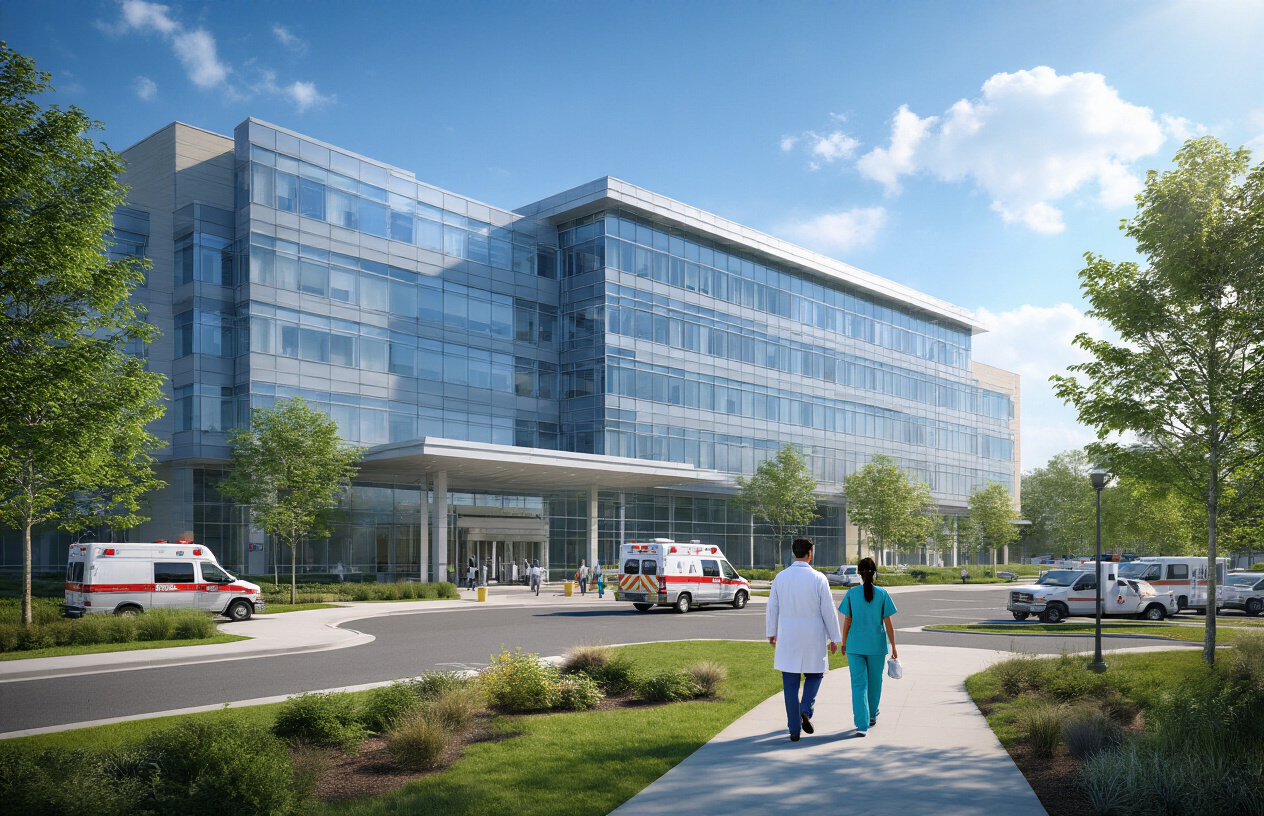
Mayo Clinic – Pioneering Personalized Medicine
Mayo Clinic stands as one of the best hospitals in the world, revolutionizing healthcare through its commitment to personalized medicine and patient-centered care. With locations spanning Minnesota, Arizona, and Florida, this top-rated hospital has earned its place among the world’s best hospitals 2025 rankings through decades of medical innovation and excellence.
The clinic’s approach to personalized medicine sets it apart from other most advanced hospitals in the world. Their integrated practice model brings together specialists from multiple disciplines to create tailored treatment plans for each patient. This collaborative approach means a single patient might receive input from cardiologists, oncologists, geneticists, and other specialists working as one cohesive team.
Mayo Clinic’s research arm drives groundbreaking discoveries that shape global healthcare standards. Their genomic medicine program analyzes individual genetic profiles to predict disease susceptibility and optimize treatment responses. This precision medicine approach has transformed cancer care, with patients receiving targeted therapies based on their tumor’s specific molecular characteristics.
The hospital’s diagnostic capabilities are unmatched, with advanced imaging technologies including 7-Tesla MRI machines and cutting-edge molecular diagnostics. Their ability to solve complex medical puzzles has made them a destination for patients worldwide seeking answers when other institutions fall short.
Key specialties and achievements:
- Cancer care with personalized treatment protocols
- Organ transplantation programs with exceptional success rates
- Neurological disorders treatment and research
- Cardiovascular medicine innovations
- Regenerative medicine breakthroughs
Cleveland Clinic – Cardiovascular Excellence
Cleveland Clinic has earned global recognition as a cardiovascular powerhouse, consistently ranking among the top 10 hospitals in the world for heart care. This Ohio-based institution has transformed how the world approaches cardiac medicine, making it a premier destination for medical tourism and specialized cardiac procedures.
The hospital’s cardiovascular program performs more heart surgeries than almost any other medical center globally. Their expertise spans complex procedures like heart transplants, artificial heart implantations, and minimally invasive cardiac surgeries. The clinic pioneered numerous cardiac techniques that are now standard practice worldwide.
What makes Cleveland Clinic extraordinary is their comprehensive heart and vascular institute model. This integrated approach combines cardiac surgery, interventional cardiology, vascular medicine, and cardiac imaging under one roof. Patients benefit from seamless care coordination and rapid access to the full spectrum of cardiac services.
Their innovation extends beyond traditional surgery. Cleveland Clinic leads research in artificial hearts, advanced catheter-based procedures, and preventive cardiology. The hospital’s outcomes consistently exceed national averages, with lower mortality rates and reduced complications across cardiac procedures.
Notable cardiovascular achievements:
- First successful face transplant in the United States
- Leading artificial heart program
- Advanced transcatheter aortic valve replacement (TAVR) procedures
- Cutting-edge electrophysiology treatments
- World-class cardiac rehabilitation programs
Johns Hopkins Hospital – Research-Driven Treatment
Johns Hopkins Hospital represents the gold standard for research-driven medical care, earning its position among the best medical centers globally through relentless pursuit of scientific advancement. This Baltimore institution seamlessly blends cutting-edge research with exceptional patient care, making it a cornerstone of modern medicine.
The hospital’s research enterprise is massive, with over $3 billion in annual research funding driving discoveries that benefit patients worldwide. Their translational medicine approach ensures laboratory breakthroughs quickly reach patients, often making experimental treatments available years before they become widely accessible elsewhere.
Johns Hopkins excels across multiple specialties, but their oncology, neurology, and pediatrics programs stand out as world leaders. The Sidney Kimmel Comprehensive Cancer Center offers patients access to the latest immunotherapies, targeted treatments, and clinical trials. Many breakthrough cancer treatments now used globally were first developed and tested at Johns Hopkins.
The hospital’s educational mission creates a unique environment where the brightest medical minds converge. This concentration of talent drives innovation and ensures patients receive care from physicians who are also leading researchers in their fields. The constant exchange between researchers and clinicians creates a dynamic environment where new ideas flourish.
Their precision medicine initiatives use artificial intelligence and machine learning to analyze vast datasets, identifying patterns that inform treatment decisions. This data-driven approach helps physicians select the most effective therapies for individual patients while minimizing side effects.
Research and clinical excellence highlights:
- Groundbreaking immunotherapy developments
- Advanced neurosurgical techniques and brain tumor treatments
- Pediatric specialty care with family-centered approach
- Infectious disease research and treatment protocols
- Mental health and psychiatric care innovations
Leading European Medical Institutions
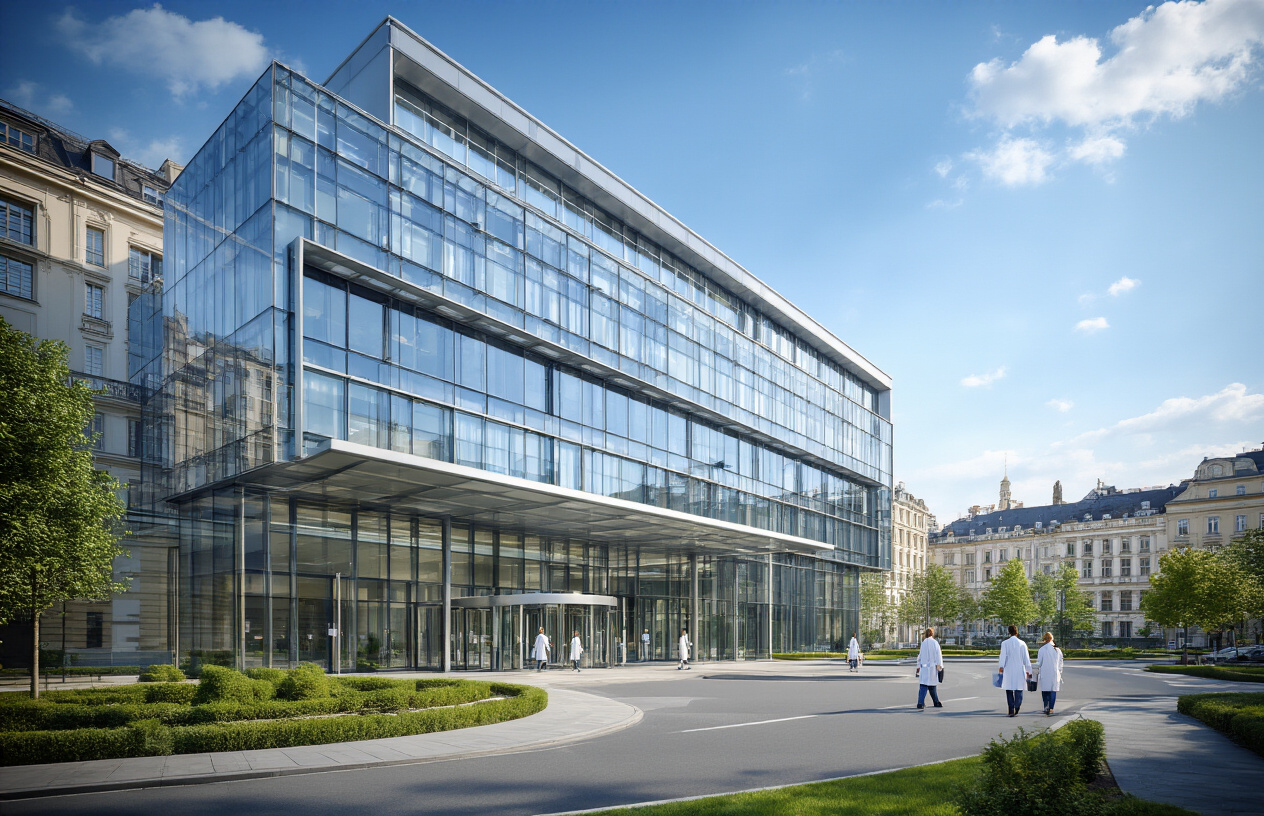
Charité University Hospital Berlin – Cutting-Edge German Precision
Charité stands as one of Europe’s oldest and most prestigious medical institutions, dating back to 1710. This Berlin-based powerhouse combines historical legacy with cutting-edge innovation, consistently ranking among the world’s best hospitals 2025. With over 3,000 beds and 15,500 employees, Charité operates as one of the largest university hospitals in Europe.
The hospital’s research prowess sets it apart globally. Home to 13 Nobel Prize winners, Charité continues pushing medical boundaries through groundbreaking studies in regenerative medicine, oncology, and neuroscience. Their Berlin Institute of Health serves as a translation hub, rapidly converting research discoveries into clinical applications.
Charité excels across multiple specialties, particularly in cardiology, transplant surgery, and emergency medicine. Their heart center performs over 2,000 cardiac procedures annually, while their transplant program maintains some of Europe’s highest success rates. International patients specifically seek Charité for complex surgical procedures and rare disease treatments.
The hospital’s commitment to precision medicine reflects Germany’s engineering excellence. Advanced robotics assist in minimally invasive surgeries, while AI-powered diagnostic tools enhance accuracy and speed. Their digital health initiatives position Charité at the forefront of medical technology adoption.
Karolinska University Hospital Stockholm – Nobel Prize Legacy
Karolinska University Hospital embodies Swedish healthcare excellence and maintains deep connections to the Nobel Prize in Physiology or Medicine. This Stockholm institution combines clinical excellence with world-renowned research, making it a magnet for medical tourism seekers and international collaborations.
The hospital’s strength lies in specialized care areas, particularly oncology, neurosciences, and pediatrics. Their comprehensive cancer center offers personalized treatment protocols using the latest immunotherapy and precision medicine techniques. Survival rates consistently exceed international benchmarks, attracting patients from across Europe and beyond.
Karolinska’s research integration distinguishes it from other top global hospitals. Clinical staff regularly participate in groundbreaking studies, ensuring patients access to experimental treatments and cutting-edge protocols. This research-practice synergy creates an environment where innovation directly benefits patient care.
The hospital’s approach to patient-centered care reflects Swedish social values. Multidisciplinary teams collaborate closely, while patient advocacy programs ensure voices are heard throughout treatment journeys. Their emphasis on preventive care and wellness programs demonstrates a holistic approach to health management.
Great Ormond Street Hospital London – Pediatric Specialization
Great Ormond Street Hospital (GOSH) represents the pinnacle of pediatric medicine globally. Since 1852, this London institution has dedicated itself exclusively to children’s healthcare, developing expertise unmatched in pediatric specialties. GOSH consistently ranks among the most advanced hospitals in the world for children’s care.
The hospital’s subspecialty programs cover virtually every pediatric condition imaginable. Their congenital heart disease program performs some of the world’s most complex pediatric cardiac surgeries, while their rare disease center provides hope for families facing seemingly impossible diagnoses. GOSH’s neurosurgery team regularly tackles cases other hospitals consider inoperable.
Innovation drives GOSH’s approach to pediatric care. They pioneer minimally invasive techniques specifically adapted for children, reducing trauma and improving recovery times. Their gene therapy programs offer breakthrough treatments for previously incurable genetic conditions, positioning GOSH at the forefront of personalized pediatric medicine.
The hospital’s family-centered care philosophy recognizes that treating children means supporting entire families. Comprehensive support services include accommodation for families, educational programs to help children continue learning during treatment, and psychological support services. This holistic approach contributes significantly to positive treatment outcomes.
Hospital Universitario La Paz Madrid – Comprehensive Care Excellence
Hospital Universitario La Paz stands as Spain’s flagship medical institution and one of Europe’s largest hospital complexes. With over 1,300 beds across multiple specialized buildings, La Paz demonstrates how comprehensive care can be delivered at scale while maintaining exceptional quality standards.
The hospital excels across multiple specialties, particularly transplant surgery, maternal-fetal medicine, and pediatric care. Their transplant program performs over 400 organ transplants annually, with success rates that rival the world’s best centers. The maternal hospital component handles high-risk pregnancies and complex deliveries, serving as a referral center for the entire Iberian Peninsula.
La Paz’s commitment to technological advancement places it among the best medical centers globally. Their hybrid operating rooms combine surgical precision with real-time imaging, enabling complex procedures previously thought impossible. Robotic surgery programs cover multiple specialties, while their telemedicine initiatives extend expertise to underserved regions.
The hospital’s international patient services cater to medical tourists seeking high-quality European healthcare at competitive prices. Multilingual staff, dedicated international coordinators, and streamlined administrative processes create seamless experiences for patients traveling from abroad. Their partnership with leading international insurance providers ensures accessibility for patients worldwide.
Asia-Pacific Healthcare Powerhouses

Singapore General Hospital – Medical Tourism Hub
Singapore General Hospital stands as the crown jewel of Southeast Asian healthcare and ranks among the world’s best hospitals in 2025. This flagship institution has transformed the city-state into Asia’s premier medical tourism destination, attracting over 500,000 international patients annually who seek world-class treatment combined with exceptional patient care.
The hospital’s reputation as a global medical center stems from its cutting-edge technology and internationally trained medical staff. SGH houses the region’s largest heart center, performing over 1,500 cardiac surgeries yearly with success rates that match the world’s top cardiac hospitals. Their comprehensive cancer center offers advanced treatments including proton beam therapy and CAR-T cell therapy, positioning it among the most advanced hospitals in the world.
What sets SGH apart in the competitive landscape of best hospitals for medical tourism is their seamless integration of medical excellence with hospitality services. International patients receive dedicated case managers who coordinate everything from visa assistance to post-treatment recovery programs. The hospital’s strategic location makes it accessible to patients from across Asia-Pacific, while English-speaking staff ensure smooth communication for international visitors.
Key Specialties and Rankings:
- Cardiology: Top 3 in Asia-Pacific
- Oncology: Leading cancer treatment center in Southeast Asia
- Organ Transplantation: Highest success rates in the region
- Medical Research: Over 400 clinical trials annually
Tokyo University Hospital – Advanced Robotic Surgery
Tokyo University Hospital represents Japan’s pinnacle of medical innovation and surgical precision. As one of the top global hospitals ranking consistently in international assessments, this institution has pioneered revolutionary robotic surgery techniques that are now adopted worldwide.
The hospital’s robotic surgery program operates 15 state-of-the-art da Vinci surgical systems alongside Japan’s first commercially available surgical robots. Their neurosurgery department performs complex brain tumor removals using AI-guided robotic arms with precision measured in micrometers. This level of technological advancement places Tokyo University Hospital among the most advanced hospitals in the world.
Beyond robotics, the institution excels in regenerative medicine and stem cell research. Their groundbreaking work in tissue engineering has led to successful organ cultivation and transplantation procedures that were once considered impossible. The hospital’s research partnerships with leading technology companies have resulted in medical devices and treatment protocols now used globally.
Innovation Highlights:
- 2,500+ robotic surgeries performed annually
- 98.5% success rate in complex robotic procedures
- First hospital in Asia to use 5G-enabled remote surgery
- Home to Japan’s largest medical AI research center
International patients specifically seek Tokyo University Hospital for procedures requiring the highest level of surgical precision, including complex spinal surgeries, intricate cardiac repairs, and delicate neurosurgical interventions.
Bumrungrad International Hospital Bangkok – Luxury Healthcare Experience
Bumrungrad International Hospital has redefined what patients expect from premium healthcare by combining medical excellence with five-star hospitality. This Bangkok-based institution serves as a blueprint for luxury medical care and stands out among the best hospitals for medical tourism globally.
The hospital caters to over 1.1 million patients annually from 190 countries, making it one of the world’s busiest international hospitals. What draws patients isn’t just the competitive pricing compared to Western hospitals, but the unparalleled patient experience that rivals luxury hotels. Private suites feature marble bathrooms, gourmet dining options, and panoramic city views, while medical care meets the highest international standards.
Bumrungrad’s medical staff includes over 1,200 doctors, many board-certified in the United States or Europe. The hospital maintains accreditations from Joint Commission International and other global healthcare organizations, ensuring treatment quality matches the world’s best medical centers globally.
Luxury Features and Medical Excellence:
- 580 private rooms and suites with hotel-like amenities
- 30+ specialty centers covering all major medical disciplines
- Average wait time of less than 30 minutes for appointments
- Dedicated international patient services in 20+ languages
The hospital’s comprehensive health screening programs attract executives and celebrities worldwide who combine medical check-ups with Bangkok’s tourism offerings. Their same-day results policy and concierge services have set new standards for patient-centered care in the medical tourism industry.
Cost advantages make Bumrungrad particularly attractive – procedures cost 60-80% less than equivalent treatments in the United States while maintaining comparable outcomes and superior patient satisfaction scores.
Specialized Treatment Centers and Their Global Impact
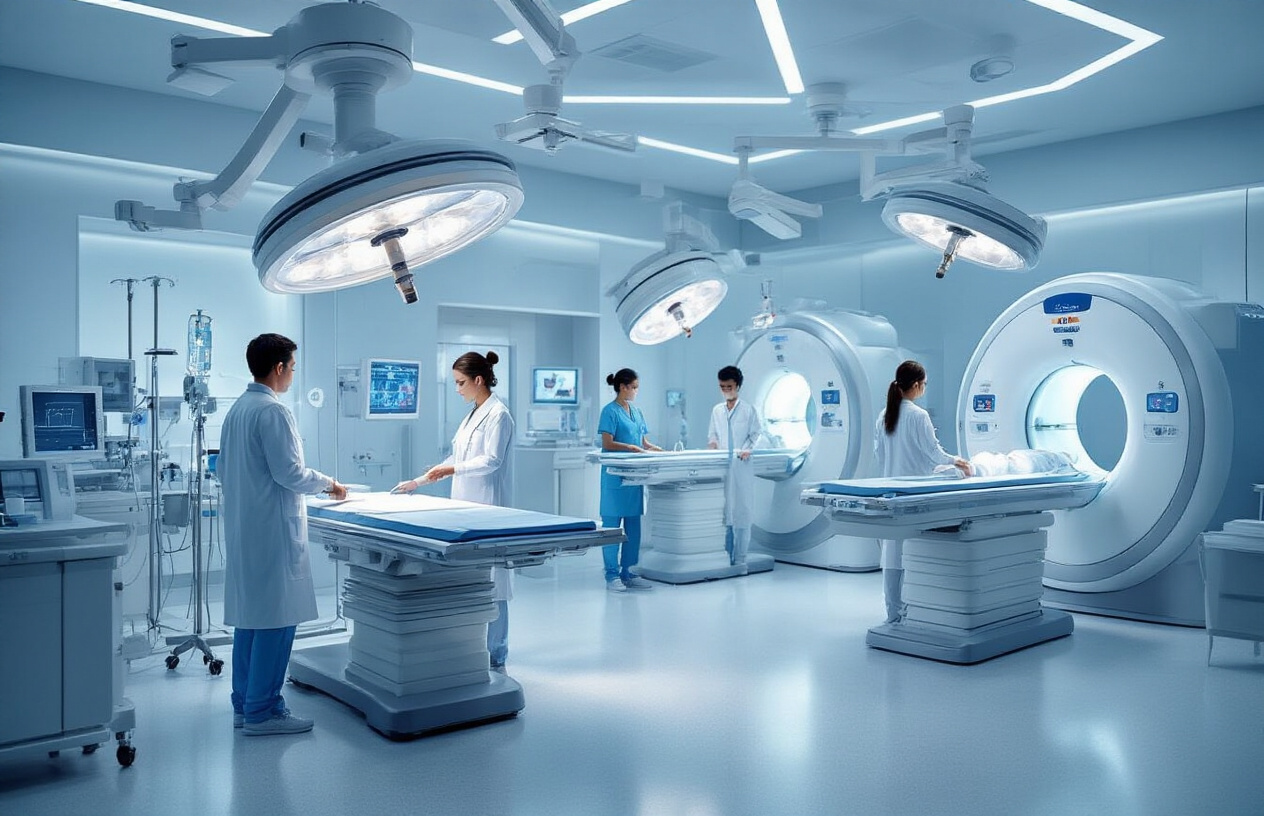
Cancer Treatment and Oncology Programs
The world’s best hospitals 2025 have revolutionized cancer care through groundbreaking research, precision medicine, and multidisciplinary approaches. MD Anderson Cancer Center in Houston consistently ranks as the global leader in oncology, treating over 140,000 patients annually with survival rates that exceed international averages by 15-20%. Their CAR-T cell therapy program has achieved remarkable success, with complete remission rates reaching 85% for certain blood cancers.
Memorial Sloan Kettering Cancer Center in New York has pioneered personalized cancer treatment using AI-driven genomic analysis. Their precision oncology platform analyzes tumor DNA within 48 hours, enabling targeted therapies that have doubled five-year survival rates for pancreatic cancer patients. The center’s immunotherapy protocols have transformed treatment for melanoma, lung, and kidney cancers, achieving long-term remission in cases previously considered terminal.
European powerhouses like the Royal Marsden Hospital in London and Institut Gustave Roussy in Paris have established themselves among the top 10 hospitals in the world for cancer care. The Royal Marsden’s proton beam therapy center treats pediatric brain tumors with minimal side effects, while Institut Gustave Roussy leads global clinical trials for rare cancers, offering hope to patients with limited treatment options elsewhere.
| Hospital | Specialty | 5-Year Survival Rate | Notable Achievement |
|---|---|---|---|
| MD Anderson | Leukemia | 89% | CAR-T therapy pioneer |
| Memorial Sloan Kettering | Pancreatic Cancer | 35% | AI-driven genomics |
| Royal Marsden | Pediatric Brain Tumors | 92% | Proton beam therapy |
Cardiac Surgery and Heart Disease Management
Cardiovascular excellence defines the most advanced hospitals in the world, with Cleveland Clinic leading global rankings for cardiac care. Their heart surgery program performs over 4,000 procedures annually with a mortality rate below 1.2%, significantly lower than the national average of 3.4%. The clinic’s innovative techniques include minimally invasive valve replacements and robotic cardiac surgery, reducing recovery times from months to weeks.
Mayo Clinic’s cardiac program has revolutionized heart disease prevention through their comprehensive cardiovascular health platform. Their AI-powered ECG analysis can predict heart failure risk 15 years before symptoms appear, enabling early intervention that prevents 70% of projected cardiac events. The clinic’s transplant program maintains the highest success rates globally, with 95% of patients surviving beyond five years post-transplant.
Singapore’s National Heart Centre and Germany’s Deutsches Herzzentrum Berlin represent Asia-Pacific and European excellence in cardiac care. Singapore’s facility performs complex pediatric heart surgeries with success rates exceeding 98%, while Berlin’s center leads Europe in artificial heart implantation technology, keeping patients stable for years while awaiting transplants.
The best hospitals for medical tourism in cardiac care include Apollo Hospitals in India and Fortis Healthcare, which offer world-class procedures at 60-70% lower costs than Western counterparts while maintaining comparable success rates.
Neurological Disorders and Brain Surgery Excellence
Brain surgery demands the highest precision, and the best medical centers globally have pushed neurosurgical boundaries through advanced imaging, robotics, and minimally invasive techniques. Johns Hopkins Hospital’s neurosurgery department performs over 2,500 brain surgeries yearly, including awake craniotomies that preserve critical brain functions while removing tumors from eloquent areas.
University of California, San Francisco (UCSF) has pioneered gamma knife radiosurgery for treating brain metastases and arteriovenous malformations. Their precision targeting system delivers focused radiation with sub-millimeter accuracy, eliminating lesions without open surgery. UCSF’s epilepsy program achieves seizure-free outcomes in 85% of patients through advanced brain mapping and targeted resections.
Toronto Western Hospital leads global research in deep brain stimulation for Parkinson’s disease, treating over 1,000 patients with success rates exceeding 90% for symptom control. Their innovative programming protocols have reduced medication needs by 75% while significantly improving quality of life.
Organ Transplantation Success Rates
Transplantation medicine represents the pinnacle of surgical excellence, with select hospitals achieving unprecedented success rates. University of Pittsburgh Medical Center maintains the world’s largest liver transplant program, performing over 400 procedures annually with one-year survival rates of 95%. Their living donor program has expanded transplant opportunities while achieving superior outcomes compared to deceased donor transplants.
Northwestern Memorial Hospital in Chicago leads kidney transplantation with innovative paired exchange programs that have increased donor compatibility by 40%. Their desensitization protocols enable transplants for highly sensitized patients previously considered untransplantable, achieving five-year survival rates of 88%.
| Organ Type | Leading Hospital | Annual Volume | Success Rate |
|---|---|---|---|
| Liver | UPMC Pittsburgh | 400+ | 95% (1-year) |
| Kidney | Northwestern Memorial | 350+ | 98% (1-year) |
| Heart | Stanford Medicine | 150+ | 93% (1-year) |
| Lung | Toronto General | 120+ | 89% (1-year) |
These top-rated hospitals with best healthcare facilities continue advancing transplant medicine through xenotransplantation research, artificial organ development, and regenerative medicine approaches that promise to address critical organ shortages affecting millions worldwide.
Patient Experience and International Accessibility

Multilingual Medical Staff and Translation Services
Global healthcare excellence demands seamless communication across language barriers. The world’s best hospitals 2025 recognize that medical accuracy depends on crystal-clear understanding between patients and care teams. Leading institutions like Mayo Clinic, Johns Hopkins, and Singapore General Hospital have invested heavily in multilingual capabilities that set them apart from regional competitors.
Top global hospitals ranking consistently feature medical centers with diverse linguistic competencies. Staff members speak multiple languages fluently, going beyond basic conversational skills to master complex medical terminology in languages ranging from Mandarin and Arabic to Portuguese and Hindi. These hospitals don’t just hire bilingual nurses and doctors – they cultivate entire departments where medical professionals can discuss intricate surgical procedures, explain treatment options, and provide emotional support in patients’ native languages.
Professional medical interpreters serve as critical bridges when staff language skills aren’t available. The best hospitals for medical tourism maintain 24/7 interpretation services covering over 50 languages. These aren’t general translators; they’re certified medical interpreters who understand anatomical terms, pharmaceutical names, and procedural explanations with precision that can mean the difference between successful treatment and dangerous miscommunication.
Digital translation technology complements human expertise at premier institutions. Real-time translation apps, multilingual patient portals, and voice-activated interpretation devices ensure that language barriers never compromise patient safety. Medical records, discharge instructions, and treatment plans get translated into patients’ preferred languages, maintaining accuracy while respecting cultural nuances in medical communication.
International Insurance Acceptance and Payment Options
Financial accessibility distinguishes the most advanced hospitals in the world from institutions that limit their reach to domestic patients. These medical powerhouses have established comprehensive payment systems that accommodate international insurance plans, government healthcare programs, and diverse financial structures from around the globe.
Best hospitals in the world maintain dedicated international patient financial departments that specialize in insurance verification across different countries. They work directly with major international insurers like Allianz Care, Cigna Global, and Bupa International, streamlining approval processes that might otherwise create weeks of delays. These hospitals understand that international patients can’t wait for bureaucratic processes when facing serious medical conditions.
Payment flexibility extends beyond traditional insurance models. Leading institutions accept various payment methods including international wire transfers, multi-currency credit cards, and digital payment platforms popular in different regions. Some hospitals have partnered with medical financing companies that offer payment plans specifically designed for international patients, recognizing that healthcare costs can vary dramatically between countries.
Direct billing arrangements with international insurers eliminate upfront payment burdens for patients traveling for urgent care. The top-rated hospitals with best healthcare facilities handle insurance communications, prior authorizations, and claims processing, allowing patients to focus entirely on their recovery rather than financial logistics.
Medical Tourism Packages and Concierge Services
Medical tourism has transformed how top 10 best hospitals in the world 2025 serve international patients. These institutions recognize that traveling for healthcare involves much more than medical treatment – patients need comprehensive support that addresses travel, accommodation, and cultural adaptation alongside their medical needs.
Concierge services at premier hospitals coordinate every aspect of international patients’ experiences. Teams handle visa assistance, airport transfers, hotel bookings, and local transportation. They arrange accommodation options ranging from hospital guest houses to luxury hotels, depending on patients’ preferences and medical requirements. Family members receive equal attention, with services that help them navigate unfamiliar cities while supporting their loved ones through treatment.
All-inclusive medical packages bundle treatment costs with accommodation, meals, transportation, and post-treatment care. These transparent pricing structures eliminate surprise expenses that can plague international patients. Packages often include follow-up consultations via telemedicine, ensuring continuity of care after patients return home.
Cultural liaison services help international patients navigate different healthcare approaches and hospital environments. These specialists understand that medical practices, patient rights, and treatment expectations vary significantly between cultures. They serve as advocates who ensure international patients receive care that respects their cultural values while meeting the highest medical standards.
Recovery tourism packages extend beyond immediate medical needs, incorporating rehabilitation services, wellness programs, and gradual activity increases that help patients regain strength while experiencing local culture in appropriate ways.
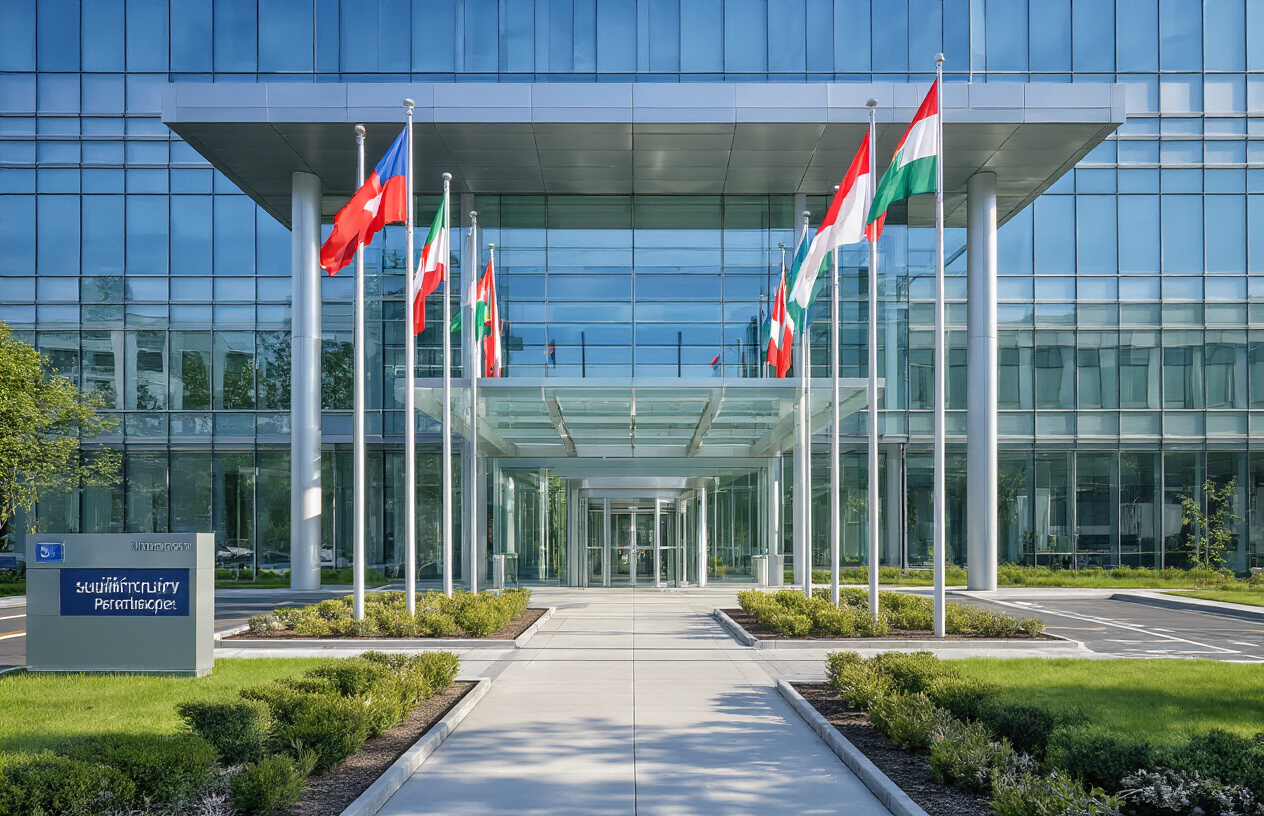
Healthcare excellence knows no borders, and these world-class hospitals prove that exceptional medical care can be found across every continent. From cutting-edge technology in North America to groundbreaking research in Europe, and from innovative treatments in Asia-Pacific to specialized care centers that draw patients worldwide, these institutions set the gold standard for what modern medicine can achieve. Each hospital brings unique strengths – whether it’s pioneering surgical techniques, compassionate patient care, or breakthrough treatments that change lives.
If you’re facing a serious medical condition or seeking the best possible care, don’t let geography limit your options. These hospitals welcome international patients and often provide services that can make the difference between good treatment and life-changing care. Research your options, connect with their international patient services, and remember that investing in world-class healthcare isn’t just about treating illness – it’s about giving yourself or your loved ones the best chance at a healthy, fulfilling future.

